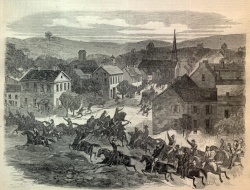Difference between revisions of "Portal:Inalienable Rights"
m |
m |
||
| Line 7: | Line 7: | ||
The phrase 'inalienable rights' was first used some time around 1760. It is synonymous with 'natural rights' and 'God given rights'. The word inalienable draws attention to the idea that such rights are immutable | The phrase 'inalienable rights' was first used some time around 1760. It is synonymous with 'natural rights' and 'God given rights'. The word inalienable draws attention to the idea that such rights are immutable | ||
| − | This concept of rights, which are due to everyone at birth, is the foundation of the rule of law - which is the foundation of the most successful governments | + | This concept of rights, which are due to everyone at birth, is the foundation of the rule of law - which is the foundation of our government. Rule of Law is the foundation of the most successful governments. England was first to rely on it through its Common Law. Then America developed it further and placed it at the center of the new government for the United States. Though both have at times strayed, these governments were set up as guardians of these fundamental rights and the people to whom they belong. |
This portal is the place to assign categories and articless that present and discuss the concept of rights as it concerned America's founders, early Americans, and how rights are understood today. | This portal is the place to assign categories and articless that present and discuss the concept of rights as it concerned America's founders, early Americans, and how rights are understood today. | ||
| Line 17: | Line 17: | ||
* Conditions in England in the early 17th century (may belong in 'America's Heritage') | * Conditions in England in the early 17th century (may belong in 'America's Heritage') | ||
* Discussions on papers, letters, and pamphlets in 18th century America that dealt with rights | * Discussions on papers, letters, and pamphlets in 18th century America that dealt with rights | ||
| + | * Rights as defined in our constitution and its amendments (may belong in 'Federalism and Democracy'. Could be assigned to both categories.) | ||
* ?? | * ?? | ||
| − | |||
</td> | </td> | ||
<td>[[File:MorganWashington.jpg|250px|link=]]<br> | <td>[[File:MorganWashington.jpg|250px|link=]]<br> | ||
Revision as of 17:11, 13 May 2014
Inalienable Rights
|
The phrase 'inalienable rights' was first used some time around 1760. It is synonymous with 'natural rights' and 'God given rights'. The word inalienable draws attention to the idea that such rights are immutable This concept of rights, which are due to everyone at birth, is the foundation of the rule of law - which is the foundation of our government. Rule of Law is the foundation of the most successful governments. England was first to rely on it through its Common Law. Then America developed it further and placed it at the center of the new government for the United States. Though both have at times strayed, these governments were set up as guardians of these fundamental rights and the people to whom they belong. This portal is the place to assign categories and articless that present and discuss the concept of rights as it concerned America's founders, early Americans, and how rights are understood today. Candidate topic outline:
|
 Morgan's Raiders entering Washington, Ohio in August, 1863 |
Categories and contentsClick on arrows to see subcategories and articles. Things you can do
|
Sand Box
|